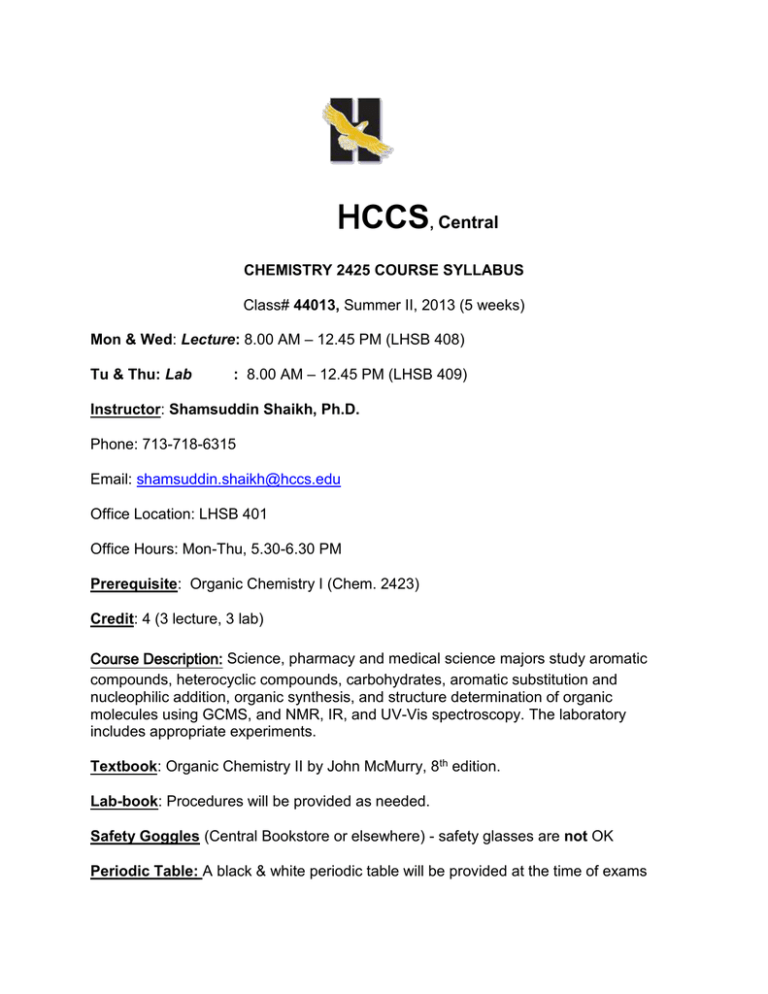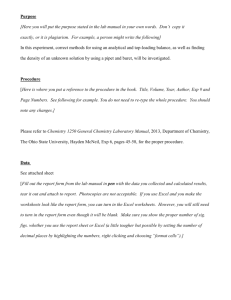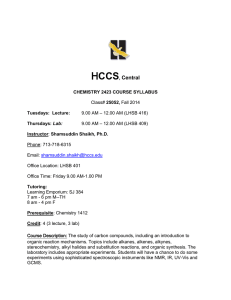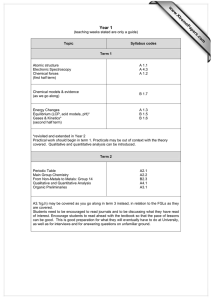Chem 2425 syllabus.doc
advertisement

HCCS, Central CHEMISTRY 2425 COURSE SYLLABUS Class# 44013, Summer II, 2013 (5 weeks) Mon & Wed: Lecture: 8.00 AM – 12.45 PM (LHSB 408) Tu & Thu: Lab : 8.00 AM – 12.45 PM (LHSB 409) Instructor: Shamsuddin Shaikh, Ph.D. Phone: 713-718-6315 Email: shamsuddin.shaikh@hccs.edu Office Location: LHSB 401 Office Hours: Mon-Thu, 5.30-6.30 PM Prerequisite: Organic Chemistry I (Chem. 2423) Credit: 4 (3 lecture, 3 lab) Course Description: Science, pharmacy and medical science majors study aromatic compounds, heterocyclic compounds, carbohydrates, aromatic substitution and nucleophilic addition, organic synthesis, and structure determination of organic molecules using GCMS, and NMR, IR, and UV-Vis spectroscopy. The laboratory includes appropriate experiments. Textbook: Organic Chemistry II by John McMurry, 8th edition. Lab-book: Procedures will be provided as needed. Safety Goggles (Central Bookstore or elsewhere) - safety glasses are not OK Periodic Table: A black & white periodic table will be provided at the time of exams Students with Disabilities: Any student with a documented disability (e.g. physical, learning, psychiatric, developmental, vision, hearing, etc) who needs to arrange reasonable accommodations must contact the Disability Support Services (DSS) Counselor at the beginning of each semester. Faculty members are authorized to provide only the accommodations requested by the DSS office. 713-718-7218. Discipline in the Class: As your instructor and as a student in this class, it is our shared responsibility to develop and maintain a positive learning environment for everyone. I take this responsibility very seriously and will inform members of the class if their behavior makes it difficult for me to carry out this task. As a fellow learner, you are asked to respect the learning needs of your classmates and assist me achieve this critical goal. Electronics in the Classroom: As a student active in the learning community of this course, it is your responsibility to be respectful of the learning atmosphere in your classroom. To show respect of your fellow students and instructor, you will turn off your phone and other electronic devices, and will not use these devices in the classroom. Academic Honesty: Zero tolerance for any type of academic dishonesty. If any student is caught while cheating in the exam or quiz, that student will get a zero in that exam or quiz. Attendance and Withdrawal Policy: Attending class regularly is the best way to succeed in this class. Research has shown that the single most important factor in student success is attendance. Simply put, going to class greatly increases your ability to succeed. This should be the easiest outcome for you to achieve in this class. You should understand that your in-class grade will suffer as a result of unexcused absences, and of course your ability to do the work required in the course will also be impaired and grades on that work will naturally be lower. Keeping perfect attendance is essential for any science class. Students are responsible by themselves for catching up the course works due to absence, tardiness or any other forms of missing the class. A student may be dropped from a course after the student has accumulated absences in excess of 12.5% of the hours of instruction. Last day for withdrawal: July 29, 2013, Monday, 4.30 PM. If you feel that you cannot complete this course, or your performance is not to the level of your desired grade, you will need to withdraw from the course prior to the final date of withdrawal. Before you withdraw from your course, please take the time to meet me to discuss why you feel it is necessary to do so. I may be able to provide you with suggestions that would enable you to complete the course. Your success is very important. New Policy for Repeated Students: Students who repeat a course for a third or more times may soon face significant tuition/fee increases at HCC and other Texas public colleges and universities. Please ask your instructor/counselor about opportunities for tutoring/other assistance prior to considering course withdrawal or if you are not receiving passing grades Testing: 2 tests will be given during the semester. The tests will take 50% of the total grade. Each test will be concentrated with specific chapters. The test date and the exact content is given in the course calendar Lab: The lab takes about 25% of the total grade. Each lab will be graded based on your attendance, participation and performance. Safety is the most important issue in the lab. You must follow the safety procedure all the time. Final: A system wide final exam will be given. It is comprehensive. The final exam will take 25% of the total grade. Make—up Policy: No make up allowed for any test, any lab and the final. Grading Policy: 2 Tests: 50% Final Exam: 25% Lab: 25% Grading Scale: 90 -- 100 A 80 -- 89 B 70 -- 79 C 60 -- 69 D Below 60 F General Suggestions Chemistry is a vast field, ranging from the study of simple inorganic salts to enormously complex molecules such as enzymes and nucleic acids in living organisms. In this course, the major topics we will be covering are chemical formulas, reactions, and stoichiometry calculations, chemical thermodynamics, electron configuration and chemical bonding, gas laws, and solutions. As you might suspect, it can be easy to fall behind and, as a result, to not be ready for the exams. Following are some general tips that may be helpful: Learning chemistry takes time. A reasonable guide is to allow your self two hours of study for each hour of lecture. Heavy work and/or class loads are not compatible with learning chemistry! Attend class regularly (!) and take generous notes during class. Ask questions. When beginning a new chapter, I recommend that you read through it quickly the first time, just to give yourself a good feel for what it is about. I you are really on the job you will have done this before the class lecture on the chapter! You will understand what's going on in class much better if you do this. Next, start tackling the end of chapter problems! Often, working problems facilitates understanding much better than just reading and rereading the chapter itself. Chemistry is a "hands on" course working problems is essential. However, do not spend an inordinate amount of time on a single problem - skip it for the time being and go on to another. Try working some of the sample exercises. They are worked out in the chapter and are very helpful. Get a good, scientific calculator that has scientific notation ("EE" or "EXP" key), log, ln, x2, , etc. Business calculators usually do not have all of these features. I still use a good ol' TI-36 Solar myself. Review basic math operations such as properties of logarithms, if you are rusty. Study groups can be very helpful. Keep the group small though, no more than three or four people. Finally, keep a positive attitude! Chemistry can be hard, but with the right attitude and approach, you will succeed in mastering it! I hope you find chemistry to be an interesting and rewarding subject which will not only be useful in your academic major, but will give you a better insight into the many scientific challenges we are facing today. I look forward to working with you this semester! Course Calendar and Content: Day Date ______________________________________ 1. 07/08 Introduction & Ch. 13 2. 07/09 Exp. 1. NMR Spectroscopy “1H & 13C NMR of butanol (C4H9OH ) isomers” 3. 07/10 Ch.14 & Ch. 15 4. 07/11 Exp.2 “Synthesis of Aspirin” and Ch. 15 contd., 5. 07/15 Ch. 16 6. 07/16 7. 07/17 Ch.17 & Ch. 18 8. 07/18 Ch. 18 contd., Exam 1 (Ch. 13-18) review 9. 07/22 8.00-10.00 AM Exam 1 (Ch.13-18) & Exp. 3: Isolation and characterization of Aspirin with UV-Vis Spectroscopy 10.30 AM Ch.19 10. 07/23 Exp. 4. Aromatic Nitration 11. 07/24 Ch. 20 and 21 12 07/25 Exp. 5 Aldehydes and Ketones & Ch. 21 contd., 13. 07/29 Ch. 22 & 23 Last day of Student withdraw 4.30 PM 14. 07/30 Ch. 24 and Exp. 6 15. 07/31 Exam 2 Review (Ch. 19-24) 16 08/01 Exp. 7 17. 08/05 Exam 2 (Ch. 19-24) 18. 08/07 Final Review (Ch. 13-24) 19. 08/08 8.00 AM final Exam (Ch. 13-24) (Comprehensive)




